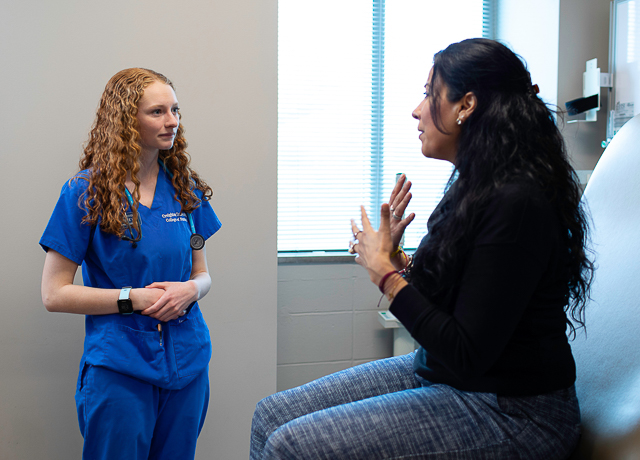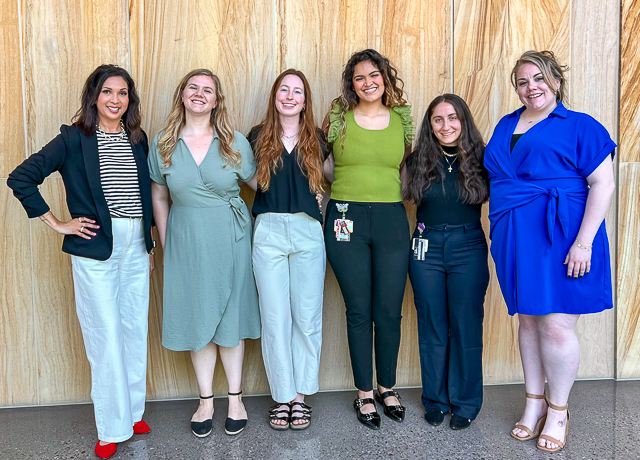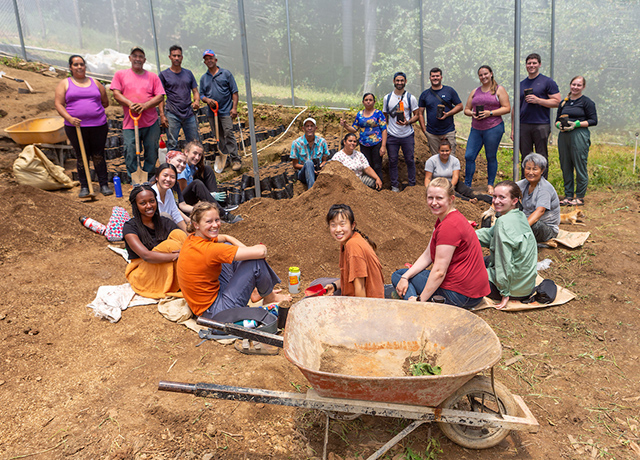Featured Testimonial About Creighton University
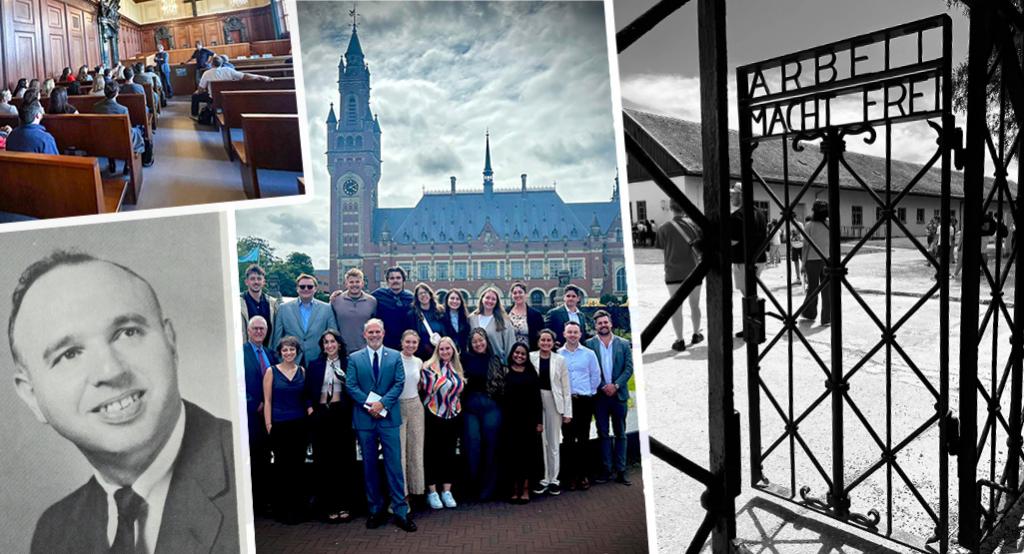
My brother (Howard Kaiman) was a true humanitarian. His passion was to make a better world for everyone. That is our family’s passion today.
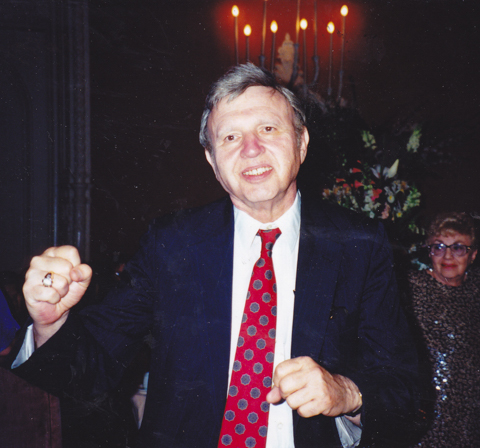
By Micah Mertes
A $2 million gift to Creighton University’s School of Law will endow a groundbreaking program and create a new center. Both will expose generations of law students to the realities of the Holocaust and the international criminal courts seeking justice for the victims of atrocities today.
The gift, made by Donna Gilbert and her children, Dave and Stacey Gilbert, endows the Howard A. Kaiman, JD'67, Nuremberg to the Hague (N2H) Program and establishes the Samuel & Ida Kaiman Center for International Criminal Justice & Holocaust Studies. Samuel and Ida, both born in Omaha, were Donna’s parents. Howard, a lifelong Omahan and attorney, was Donna’s brother.
Before he passed away in 2023 at the age of 93, Howard Kaiman asked his family to distribute his estate to worthy causes. They have also given $8 million to the Omaha Jewish Foundation for a donor-advised fund to support the Jewish community, in addition to the gift to Creighton.
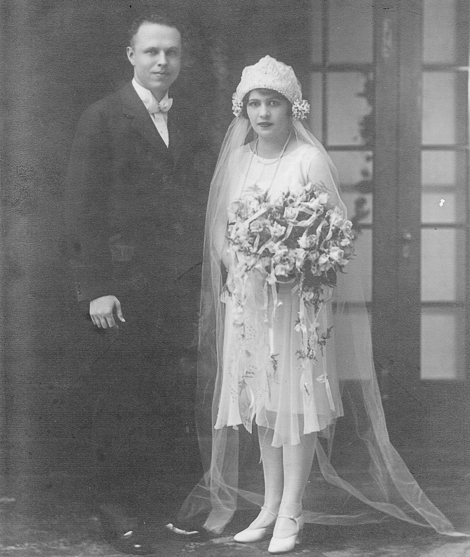
“My parents and brother lived their lives doing good deeds and good work, both for our family and for our communities,” said Donna (Kaiman) Gilbert. “They taught me that our purpose in life is to do what we can to make this life better.
“This program and this center at Creighton will continue my family’s work. They will keep the memory of the Holocaust alive for a new generation. They will challenge them never to forget that this happened and that it can happen again, very easily, if we don’t remember.”
Every summer for more than a decade, the School of Law’s N2H program has taken between 25 and 30 students to Germany, the Netherlands and Poland to learn firsthand about the Holocaust. The program immerses them in a series of historical and legal experiences, combining classroom instruction with trips to actual crime scenes, places of conspiracy and trials for crimes against humanity being litigated today.
(Watch a video interview with Howard Kaiman from 2020.)
* * *
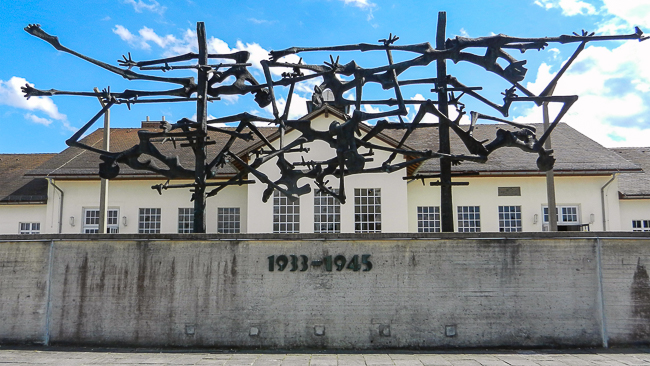
This past summer, a trio of Creighton law students in the N2H program were walking around Germany’s Dachau concentration camp when they met a woman lost in thought and standing near the crematorium.
The students spoke with the woman, Tammy Lubetzky Stavinsky, and learned that she had been thinking about her father, who had once been a prisoner at this very spot. Roman Lubetzky and his family were among the 200,000 Jews of Lithuania who Hitler’s Germany sought to eliminate. Roman spent years in a ghetto, labor camp and eventually Dachau. When American troops liberated the concentration camp in 1945, Roman was 6 feet tall and weighed 70 pounds.
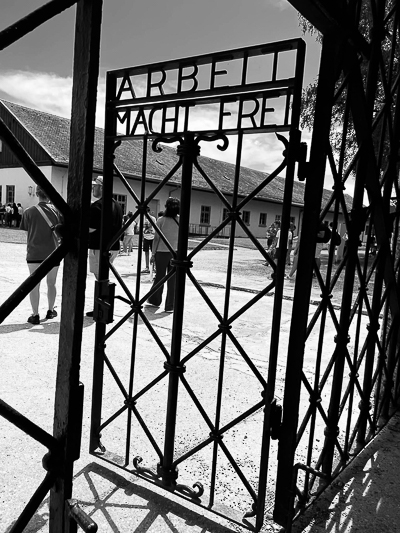
Two years later, Roman emigrated to Mexico to start a new life. He eventually moved to the United States with his wife, Sonia, and children, Tammy and her brother, Daniel Lubetzky, who today is the founder and executive chairman of KIND Snacks.
When Tammy asked the students what they were doing in Dachau, they told her they attended a law school at a Jesuit university in the middle of the Great Plains and that they were part of a summer program that sends students to Europe to bear witness to the sites of Nazi war crimes and the trials that followed.
Tammy was thrilled that such a program exists. Cassandra Harper, one of the Creighton law students who met Tammy, said it was an experience she’ll never forget.
“It’s one thing to read about the Holocaust, but it’s another thing entirely to be in Dachau, talking with someone with specific ties to the Holocaust,” said Harper, a second-year Creighton law student and future public defender. “The N2H program makes experiences like this possible. It gives you the kind of knowledge you don’t just know but can feel, deeply.”
Each summer, a few dozen N2H students like Harper see the traces of Germany’s Nazi past by visiting former concentration camps, such as Dachau and Auschwitz, as well as Hitler’s “Eagle’s Nest” retreat in the Alps.
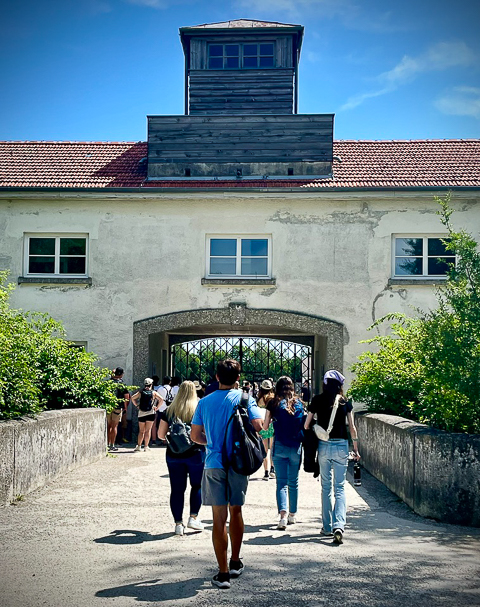
They go to the Hague, Netherlands, the Bavarian city that hosted the Nazi war crimes trials after World War II and is considered the birthplace of modern international criminal law. They visit Poland, where war criminals are being prosecuted in the International Criminal Court, the Special Chambers of the Special Court for Kosovo and the International Criminal Tribunal for the Former Yugoslavia.
N2H is open to all Creighton students. Students throughout the U.S. and Germany are also welcome to apply. When each Creighton cohort of N2H students returns to Omaha, they share their experiences with local high schools.
Harper, who chose Creighton’s School of Law in part because of N2H, said the purpose of the program’s immersions is to offer more people a clear-eyed view of our current moment. “We look at what’s happening today through the lens of the past. We learn to spot the signs and the injustices that can lead to atrocities.”
How can we stop something horrible, she said, unless we can see that it’s already happening?
* * *
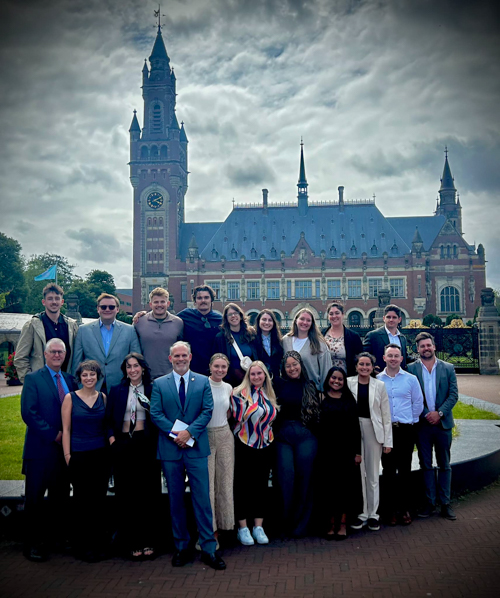
With their creation of the new Kaiman center and endowment of its marquee N2H program, Howard Kaiman and the Gilberts have “forever changed how we teach the Holocaust, genocide and international criminal justice at Creighton,” said Michael J. Kelly, JD, LLM, the Senator Allen A. Sekt Endowed Chair in Law Professor and director of the N2H program.
While the endowment of the N2H program will ensure its perpetuity, the new center will build upon and broaden its impact and influence.
“The Kaiman Center will help us continue to counter the rise in antisemitism by countering the rise in Holocaust denial,” Kelly said. “The center also provides us the invaluable opportunity to explore more deeply the international atrocities taking place today and the courts tasked with litigating them.”
The Samuel & Ida Kaiman Center for International Criminal Justice & Holocaust Studies could, Kelly said, bring in world-renowned attorneys to speak about genocide litigation, explore cases currently being tried in the International Criminal Court of Justice, examine the genocide of the Rohingya in Burma, the Kurds in Iraq and other repressed peoples throughout the world.
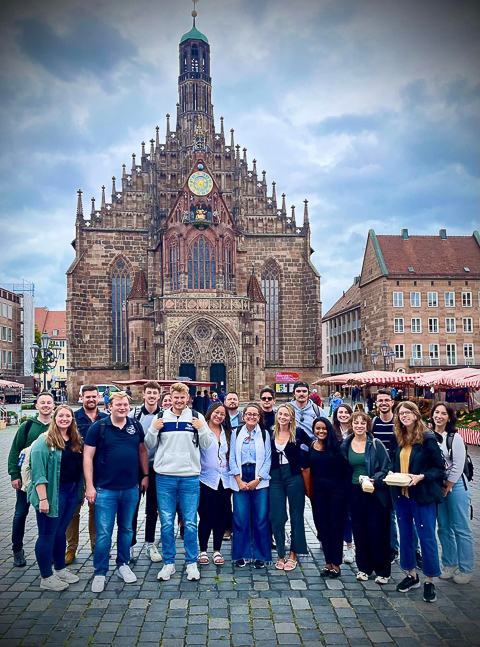
The center has the potential to create new classes and programs, new travel opportunities, further research and publication, and even cases where Creighton law students can assist with litigation. It will present more opportunities to more students, at Creighton and elsewhere, as well as alumni and community members. This summer, 25 to 30 individuals from the Jewish Community Center of Omaha are expected to join students on the N2H trip.
Since its founding, the N2H program has been funded primarily by student tuition, though it’s also been supported by Friedrich-Alexander-Universität, Universität Erlangen-Nürnberg, the Institute for Holocaust Education, the War Crimes Documentation Center, the U.S. National Section of the International Association of Penal Law, the Goldstein Foundation, the Livingston Foundation and the Staenberg Family Foundation.
The endowment will also provide scholarship opportunities for students who can’t afford the program's full tuition.
* * *
The profound effect the trips are having on students’ lives has inspired the School of Law to replicate N2H at other universities.
“We have a template that works, and we want to give it to schools across the country and perhaps officially partner with them in some way,” Kelly said. “We’re looking at other Jesuit law schools and universities with a social justice mission, schools in cities where there’s a strong Jewish community presence.”
Kelly recalled how the N2H program started at Creighton itself.
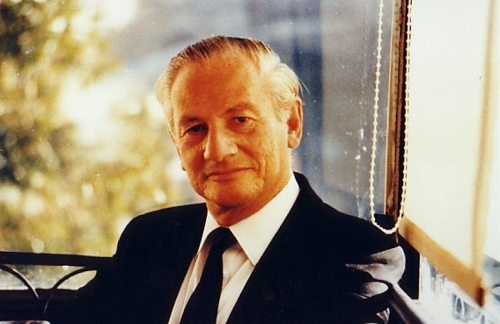
It originated in 2011, with a campus visit from jurist Gabriel Bach, a former judge of the Supreme Court of Israel and the deputy prosecutor in the trial of former Nazi official Adolf Eichmann. Bach stayed in Omaha for three days to deliver lectures, speak with faculty, students and community members, and describe his experience of prosecuting the architect of the Holocaust. In 1938, Bach’s family had emigrated from Germany. He was the only survivor of his Jewish classmates from primary school.
Bach was joined by other Holocaust survivors throughout his trip. It was a cathartic moment, Kelly said. “Here was Bach, who is not from Creighton, and these survivors, who were not from Creighton, coming together at Creighton to share their experiences.
“That’s the thing about Creighton. We’re in the business of creating spaces for people to become the fullest versions of themselves they can be. This experience was exhibit A.”
At the end of Bach’s visit, the 84-year-old told Kelly, “We have to keep these memories alive. We have to keep educating people about the Holocaust. What are you going to do? It’s up to you.”
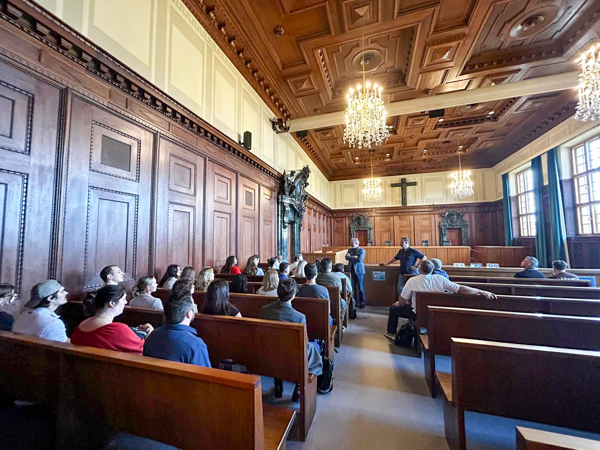
“Our answer to his challenge,” Kelly says, “was the N2H program. Now, a decade has passed. Bach has passed away. Those survivors have passed away. But we’re still doing this. We’re still responding to that challenge.”
With the new center, Kelly said, Creighton can extend the program’s mission and reach farther than ever.
Dave Gilbert would like to see the N2H program duplicated at as many universities as possible, including his alma mater, the University of Southern California. “The Creighton program is already beautiful,” he said, “and we want to see it taken farther and farther and to as many people as it can go.”
Gilbert said that Creighton University is the ideal school to originate efforts like N2H and the Kaiman Center, and that his uncle and grandparents are the perfect namesakes.
* * *
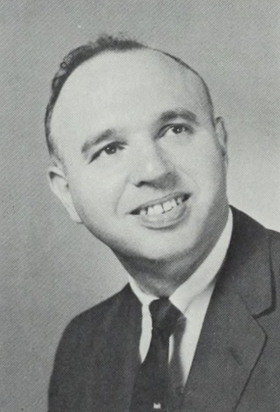
In the 1960s, during a highly antisemitic period when Jews were denied by country clubs and colleges alike, Howard Kaiman was able to attend Creighton, where he took night classes at the School of Law.
“We think highly of Creighton,” Dave Gilbert said. “They were inclusive of Jews when a lot of other people weren’t. Creighton gave my uncle his dignity.”
Kaiman spent the rest of his life bestowing kindness, compassion and dignity to others, something he, Donna and their late brother Ernie learned from their parents, Samual and Ida Kaiman.
Samuel and Ida were their greatest teachers, ever stressing the virtues of service and education (both Jewish and secular). Samuel worked as an accounting clerk at Union Pacific. Like Howard after him, Samuel took night classes at the law school but never practiced.
Samuel died young, of heart disease, at the age of 55 in 1960. Ida lived another 37 years, passing away in 1997.
“They lived very humbly,” Dave Gilbert said of his grandparents. “They did so much good for the Omaha community, and they sacrificed everything for their family. They made a better life for their children, and the opportunities they gave them led Howard to Creighton.”
After graduating from Creighton law school, Howard Kaiman quickly established himself as a highly respected attorney, specializing in corporate law, estate planning, tax law and personal injury. His work took him to the highest levels of the profession, including appearances before the Nebraska Supreme Court.
Kaiman was a committed member of the Omaha Jewish community and was active in many organizations promoting Jewish culture and education. He was a regular attendee at Temple Israel, where he served on the Board and was involved in numerous events and programs. He was also a member of the Board of the Jewish Federation of Omaha and worked closely with local Jewish schools to provide mentorship and guidance to young students interested in pursuing careers in law.
Kaiman championed the causes of all disadvantaged Omahans. He helped create a more affordable “working man’s court” for those seeking small claims in Nebraska. He helped lower bus fares in the city. He fought against telephone company rate increases and all price hikes that targeted senior citizens.
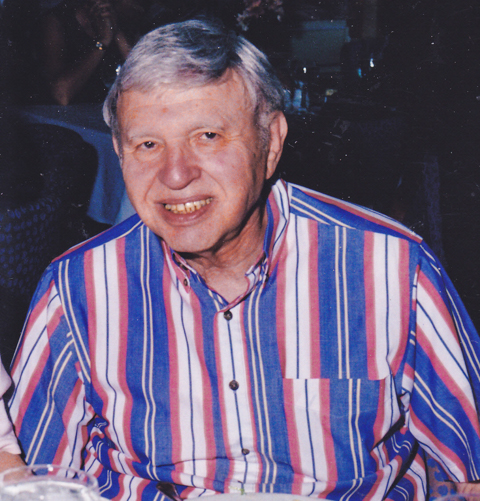
“My brother was a true humanitarian,” said Donna Gilbert. “His passion was not just to make a better world for Jews in his own small way but to make a better world for everyone. That is our family’s passion today. And it’s a passion that, we believe, will carry on in this wonderful program and center in the School of Law.”
* * *
Howard Kaiman carried Creighton with him his entire life. In November 2004, Kaiman read in the Omaha World-Herald a Thanksgiving homily written by then-Creighton President Rev. John P. Schlegel, SJ. The homily called on those to give thanks to God by giving back to the world.
“It is not enough simply to give thanks to God for our many blessings,” Schlegel wrote. “We must act in response to God’s generosity. What do we do with these blessings we have received? Each of us has our own unique gifts from the Lord. How do you respond? That is for you to answer in deeds, not in words.”
Kaiman was so moved by Father Schlegel’s homily that he wrote a short letter to the editor that The World-Herald published soon after.
“(Father Schlegel’s homily) made me proud to be an alumnus of Creighton University,” Kaiman wrote. “I have put the homily on my desk as a constant reminder that we are blessed by God to live in the United States and especially in Omaha.”
* * *
